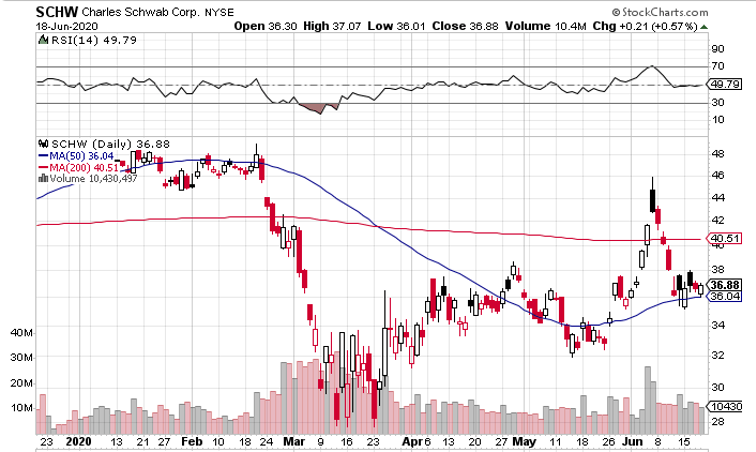Wall Street will be watching Charles Schwab’s
NYSE: SCHW ticker tape closely today after the brokerage firm just about missed analyst expectations with their Q4 earnings, released after Thursday’s session. Even though revenue contracted year over year, some leeway will surely be given considering the wild end to 2019 that Schwab (and many other brokerages) had but that few were expecting.
CFO Peter Crawford commented, “We achieved impressive financial results in 2019 given the somewhat more challenging than expected macroeconomic backdrop and our own pricing decisions. We delivered a record $10.7 billion in total revenue, up 6% year-over-year, which was just shy of the range we outlined at the beginning of the year. Net interest revenue increased 12% from the prior year to $6.5 billion, driven by higher average investment yields – even after the Fed’s rate cuts – and an increase in client cash balances held at our bank and brokerage subsidiaries. While trading revenue declined 19% to $617 million due to our pricing actions, asset management and administration fees of $3.2 billion remained essentially flat year-over-year.”
Huge Industry Changes
The race towards the bottom between online stockbrokers and their commissions ramped up a gear in October when Schwab announced they were scrapping all commissions on stock trades. Since the likes of Robinhood burst onto the brokerage scene with a no-fees mission in 2013, the more traditional brokers like Schwab, TD Ameritrade NASDAQ: AMTD and E-Trade NASDAQ: ETFC have struggled to remain attractive to newer traders or those with smaller accounts. It felt like the levee broke in October when, like dominoes, they and many others announced they would no longer charge fees on stock trades.
Schwab was the first of the big names to announce the move with almost immediate effect. Unsurprisingly, shares tanked with the news as a major source of revenue was wiped off the books. Schwab’s stock was down over 10% on the day of the announcement as investors ran for the door in the face of massive uncertainty. With shares back at 2016 levels, it looked as if the downtrend that had started in May 2018 was set to continue.
However, in the days that followed, as Schwab’s competitors joined them in the change, they seemed to take more heat. While trading fees made up about 7% of Schwab’s revenue, they made up 25% of TD Ameritrade’s and 16% of E-Trade’s.
Becoming an Industry ‘Goliath’
Unsurprisingly then, TD Ameritrade had their worst day since 1999 as shares dropped 25% in a single session following the news. As it became clear that Schwab would not be as impacted as other brokerages, investors started size up the company’s remaining edge and looked upon Schwab favorably. This was helped by the surge in new customers that piled in on the news. Schwab added almost 150,000 new accounts in October, which was a stunning 30% increase on September’s figure. While its peers also saw big jumps in trading activity and new accounts, none came close to matching Schwab’s new business numbers.
The writing would have been on the wall for the likes of TD Ameritrade and E-Trade in the face of this new phase of the competition and both were likely hoping for an acquisition to give them an easy out. Towards the end of November, the former was asked to dance, with Schwab buying TD Ameritrade for $26 billion in an all-stock deal which should be completed by the end of 2020. Analysts remarked how this consolidation will create a Goliath in the brokerage industry and were eager to announce upgrades to the stock and their price targets. On the back of this, investors were only too happy to buy in and by December, shares were at 52-week highs.
Looking Ahead
It’s been almost 4 months since the commission-free trades news broke and shares of Schwab are sitting pretty with a 37% rally in the meantime compared to E-Trade’s 27%. It will really be their Q1 earnings, due in April before investors can assess how the revenue streams have been affected. For now, Schwab looks best positioned to come out of this seminal industry change on top. The last time they cut fees, in 2017, Schwab more than made up for it by growing assets under management. That appears to be the plan again this time. 2020 will tell us a lot about their ability to lead from the front into the new decade.

Before you make your next trade, you'll want to hear this.
MarketBeat keeps track of Wall Street's top-rated and best performing research analysts and the stocks they recommend to their clients on a daily basis.
Our team has identified the five stocks that top analysts are quietly whispering to their clients to buy now before the broader market catches on... and none of the big name stocks were on the list.
They believe these five stocks are the five best companies for investors to buy now...
See The Five Stocks Here
Nuclear energy stocks are roaring. It's the hottest energy sector of the year. Cameco Corp, Paladin Energy, and BWX Technologies were all up more than 40% in 2024. The biggest market moves could still be ahead of us, and there are seven nuclear energy stocks that could rise much higher in the next several months. To unlock these tickers, enter your email address below.
Get This Free Report
Like this article? Share it with a colleague.
Link copied to clipboard.